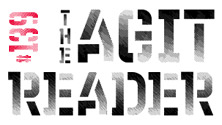
Angles
RCA
It would have been one thing if Angles, only the Strokes’ fourth album in a decade, was released on a spontaneous whim to an unsuspecting public. With more than enough hooks here to last us through the summer and beyond and arguably superior to the completely deflated Strokes of First Impressions on Earth, Angles could have been a coup de grace re-anointing the band as modern rock’s preeminent pop stalwarts. But instead of using the element of surprise, in the endless months preceding Angles, tales eked out of inner-strife, forced separation, juggled producers and plenty of “Go Your Own Way”-type drama, which has resulted in an uneven collection of “everybody’s” songs. Not that there’s lost hope in the Strokes collaborating to reveal the individual strands that make them who they are as a whole, but when faced with a choice between the Julian Casablanca–penned finale, “Life Is Simple in the Moonlight,” and Nikolai Fraiture’s ugly and indulgent “You’re So Right,” the A-side will always win. It begs questioning if we really want the Strokes to stray, to continue splintering and exploring, if it leads to this? Wouldn’t a Nickel Eye album be more appropriate for thorny experiments with faux-metal punk-pop? Wouldn’t the ultra-neon chillwave apocalypse of “Games” be better suited for Casablanca’s underrated solo endeavor?
I suppose dissecting Angles to this degree stems from a want for past triumphs, and with songs like the lead single, “Under Cover of Darkness,” and the effortless jukebox charm of “Gratisfaction,” the band proves they can recreate the Strokes of old even working as disparate satellites. Angles as the “future” is something that’s been tossed around in quotes anticipating the album, met equally with quips about how Angles was labored and undercooked. “Metabolism” is the perfect approximation of this teetering perspective. It does parallel the radio-shifting pop of legends like the Cars and Queen, though simultaneously muffled by Casablanca straining to accommodate the prog-ish cues of his peers. It’s that discombobulating that drags a good half of the record. It may be a stretch to compare Casablanca to Peter Gabriel’s role as Rael, the protagonist in Genesis’ The Lamb Lies Down on Broadway, but you can hear his existential yawns throughout. Whether he’s singing “Monday, Tuesday is my weekend” on “Taken for a Fool,” or punching in punch-drunk yelps where they’re no longer needed, he sounds more indifferent than usual. Still, it all depends on what one expects from the Strokes circa 2011. So far this year, nothing can eclipse the nightcap bliss of “Life Is Simple in the Moonlight” or the minimal, almost jazzy, swoon of “Call Me Back,” and for that perhaps we should be grateful. Do you want this Strokes or nothing at all, because Angles just isn’t it?
Kevin J. Elliott

Actor-Caster
Park the Van
Somehow it seems appropriate that the first time I heard the Generationals was on the radio. (When was the last time you said that?) Sure, it was one of the not-for-profit/college stations on the low end of the New York area dial, but nonetheless this New Orleans (by way of DC) duo has a knack for songs instantly catchy, the kind that would have once warranted airplay on a larger scale. And it is this kind of songs that fill the band’s latest, Actor-Caster.
Actor-Caster begins with “Ten-Twenty-Ten,” a song that combines a reverberating guitar hook, handclaps, maracas and a mechanized bass boom to great effect. It’s cadence is lean, but no less evocative because of it. The rest of the album similarly uses a minimal cadre of sounds, but each song manages to transcend its construction. “I Promise” bounces on a snappy beat and jangly riff, inflating the yearning of its lyrics with effervescence. “Yours Forever” is a cascading electro-ballad reminiscent of OMD, neon tones emphasizing the song’s infatuation. The album’s charms stem from the duo’s knack for lacing these sparkling songs with classic themes of love and loss, in the process spinning pop archetypes into gold.
Stephen Slaybaugh

Tan Bajo
In the Red
The Boricua dudes of Davila 666 are back again with another solid slab of awesome slacker punk. I like to think that each one of these songs stems from a night hanging out in the garage jamming and partying. For some reason, I have a vision of them all plugged into Doc Brown’s gigantic guitar amp that Marty blows at the beginning of Back to the Future. This gargantuan amp is in the back of the garage, but it’s turned down real low so you can hear the drums perfectly and mix the vocals and weirdo monster sounds in clearly. There’s only one microphone to sing into so the dudes have to crowd around it. Through the cloud of weed smoke, just beyond the keg, some obscure genius is manning a big tape machine, capturing every peculiar punk noise from “Tan Bajo,” the crooner with an infirm sounding Farfisa that opens the record, to the chocolate cookie jingle (or something?) of the closing hidden track.
True to the form Davila 666 has been working on since its inception, this isn’t just chugga-chugga, oi-oi punk relying on recycled Ramones hooks to pass for songwriting. There’s more Buddy Holly or Jerry Reed here than Joey and Johnny. “Yo Seria Otro” is a leather and lace heartbreaker a la “Leader of the Pack,” and “Esa Nena Nunca Regreso” is a head-bobbing sing-along that will surely find it’s way into classics collections. All of these songs have lyrical, rhythmic, and melodic hooks that will catch you right away, but even after listening to the album straight through four times, I can’t get enough. It doesn’t really matter if you know any Spanish (“Tan Bajo” essentially means “lowbrow”), because the language of punk is clear and fun, and Davila 666 just keeps making it cooler and cooler.
Michael P. O’Shaughnessy
MP3: “Esa Nena Nunca Regreso”

101
Blue Note
What a difference a few years makes. For the bulk of her career, Keren Ann could be depended on to drop smoky folk with the occasional orchestral pop or cabaret touch. The word “tasteful” was a constant adjective, but now four years removed from her self-titled record, Ann has flipped the script with her new record, 101.
Although it may be a bit lazy and far too simple to use the album’s artwork as a barometer, the change is so striking that it can’t help but set up expectations. Gone are soft-focus ethereal portraits, replaced by a sharp pageboy and Bond-girl stance. If nothing else, you know you’re in for something different. Ann rewards that belief by coming out swinging. The lead single and opening track, “My Name Is Trouble” is a damn near rave-up compared to some of her earlier songs. But judged on its own merits, it’s a bubbling up-tempo groover, something you’d never expect from Ann. It’s like Diddy decided to make a country record.
To be fair, Ann had expanded her sonic reach on Keren Ann, so the change in direction is not totally out of nowhere. Still, you can feel the glee pouring from 101 as she tackles a variety of different textures. There are snatches of high lonesome country, ’60s girl groups, early Portishead and a touch of U2’s “Numb.” But Ann doesn’t totally abandon her classic sound. The hushed confessionals are still in supply, only this time they’re paired with swaggering playful songs like “Sugar Mama.”
Additionally, 101 makes a strong case for Ann as a producer. Whenever a singer makes this hard a turn, it’s fairly simple to assume it’s the work of an outside hand. But as with the last few records, Ann handled the production. She brings the same uncluttered approach that she does to her performances. There are such a wide variety of styles that it could have sounded like a hodgepodge, but it is a wholly unified work. The old saying goes that without risk there’s no reward, and here congratulations are in order as the risks paid off.
Dorian S. Ham

Warma EP
Famous Class
The Darlings came to our attention at the end of 2009 with the release of their rambunctious debut, Yeah I Know, and as such, we promised great things were sure to come for the Brooklyn band. With the release of Warma, Darlings’ new five-song EP, the group’s promise has begun to come to fruition.
In mays, Warma is everything that Yeah I Know was, but multiplied. It’s at once rougher and sweeter, wilder and more polished. The guitar on lead-off track “Don’t Be So Hard on Yourself” squawks and squeals before veering into a rugged surge of riffs. One gets the sense, though, that songwriter and guitarist Peter Rynsky is more in control, flexing his muscles and letting loose with the knowledge that he is now able to reign it all back in whenever he wants. Also adding to the band’s newfound yin-and-yang, keyboardist Maura Lynch’s vocals counterbalance Rynsky’s yowl, underpinning each song’s scruffy veneer with some sweetness. And on “Don’t Wanna Hang Out Tonight,” the band reveals its songwriting becoming more nuanced as well, a certain amount of tenderness added to their range of emotions. If the next full-length is anything like this, it will surely eclipse all our expectations.
Stephen Slaybaugh
ALBUM REVIEWS
New York Dolls, Dancing Backward in High Heels
Rise Against, Endgame
Hype Williams, One Nation
Exene Cervenka, The Excitement of Maybe
REM, Collapse Into Now
Kurt Vile, Smoke Ring for My Halo
Wye Oak, Civilian
Ancient Astronauts, Into Bass and Time
The Electronic Anthology Project, The Electronic Anthology Project
Lykke Li, Wounded Rhymes
Tim Cohen, Magic Trick and Bad Blood EP
Beady Eye, Different Gear, Still Speeding
Acrylics, Lives and Treasure
Cheveu, 1,000
